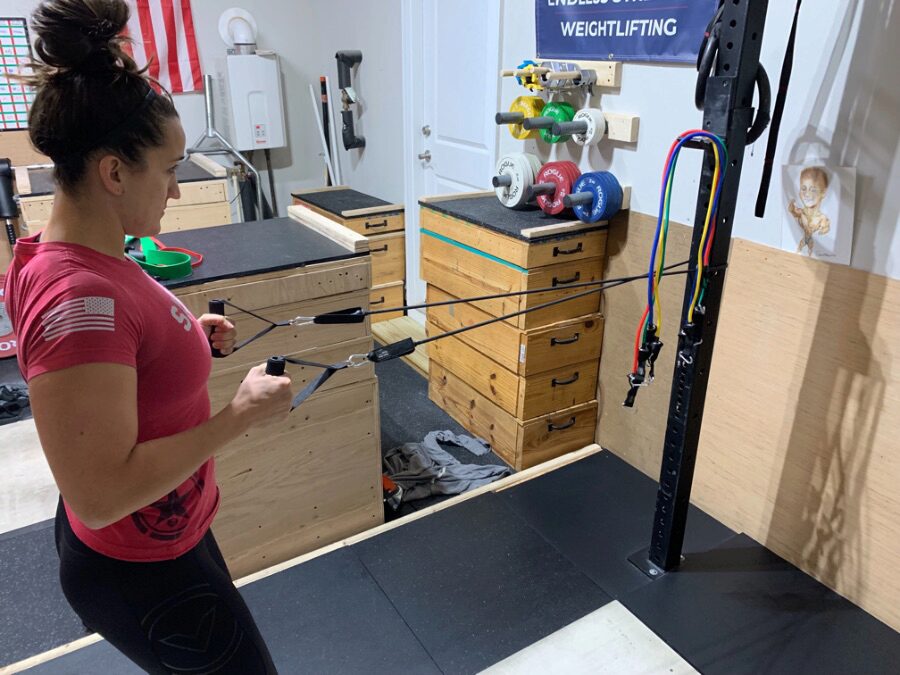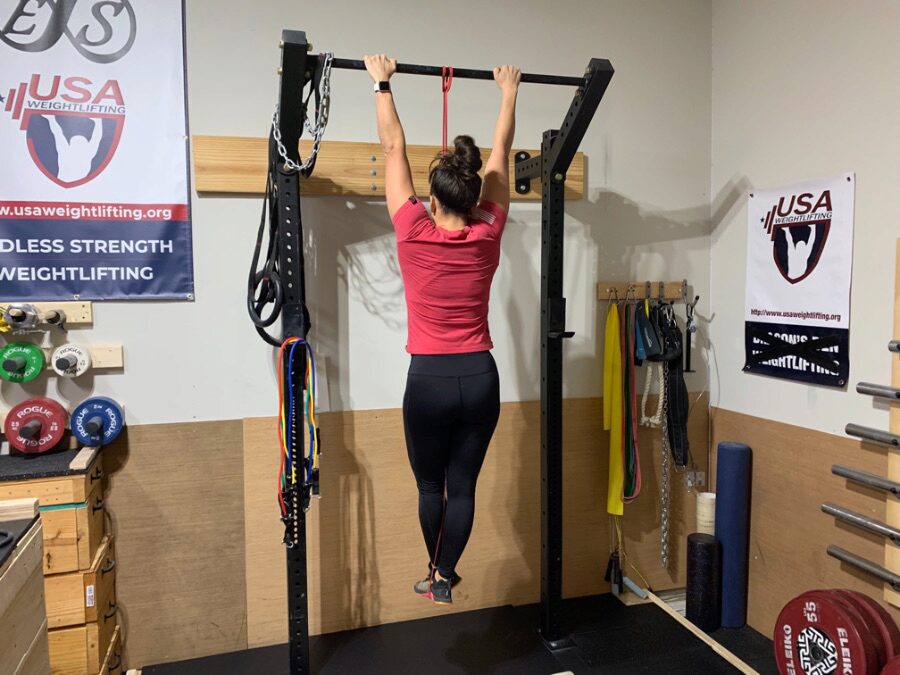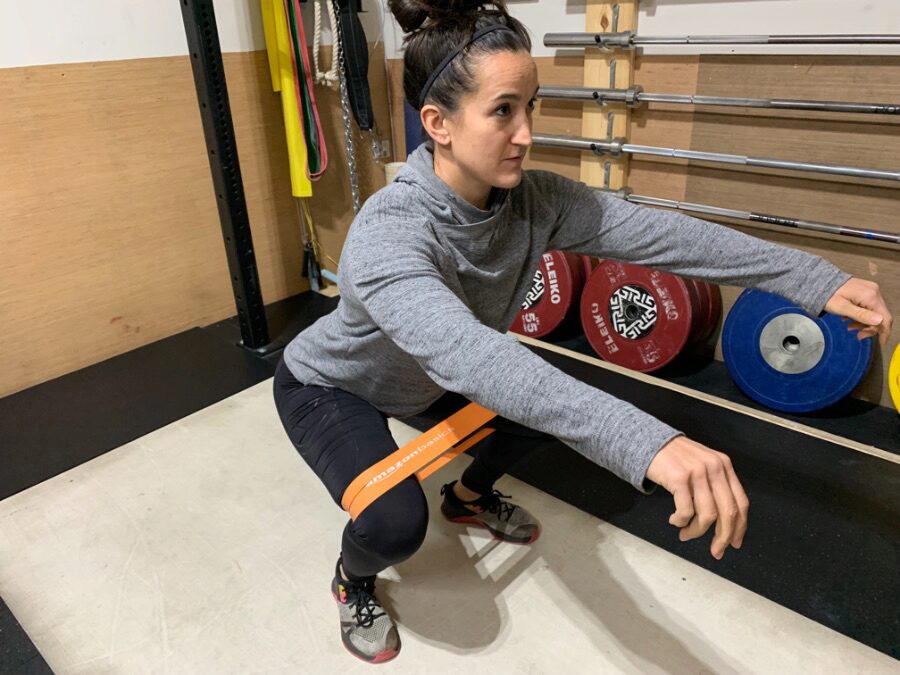We test and review fitness products based on an independent, multi-point methodology. If you use our links to purchase something, we may earn a commission. Read our disclosures.
When you think about strength training, the first items that may come to mind could be barbells, dumbbells, or even bodyweight exercises. Those are all great tools for the training trade, but another asset you should highly consider are resistance bands.
The best resistance bands can help people of all fitness levels improve, regardless of what the goal is that they are pursuing. They can be used for warm-ups, physical therapy, and even as an individual workout in a fitness routine.
What Are Resistance Bands?
Resistance bands come in two forms. The loop bands are rubber bands that come in either small loops about 1 foot long or larger loops about 3 feet long. There are also resistance bands with handles. Both types can be bought as sets or as singles. Most of these bands are made from latex rubber, though there are latex-free bands available.
These exercise tools were originally considered an accessory for powerlifters as a way to increase the load they worked with as the lift progressed. However, depending on the type of band you get, you can now use them for a range of physical activities.
Here are eight benefits of resistance bands that make them a must-have in your garage gym or gym bag.

1. Build Strength
Building muscle strength can be accomplished in a number of ways: squat with a barbell, press a dumbbell, do kettlebell swings.
You can also use resistance bands.
A 2019 meta-analysis concluded that using resistance bands promotes similar strength gains to conventional resistance training. Yes—you can get stronger and even build muscle mass by using resistance bands!
How? As you perform the exercise of choice, the band will increase resistance as it is stretched. This forces the working muscles to adapt to the increased load as it is flexing. You then control the negative portion of the rep and return to the starting position, loading the muscles eccentrically.
2. Efficient Muscle Recruitment
Put an elastic band under tension and you’ll notice a wobble. That wobble is part of what makes resistance band training great: Your body has to work to keep the band stable.
In fact, a 2017 study published in the European Journal of Sport Science concluded that when resistance bands are at their end-range of tension during exercise, they produce similar muscle activation compared to traditional resistance modalities, like the barbell.
Research has shown that using bands for squats, which work the quads, glutes, and hamstrings, engages the core in a similar fashion as the free weight version of the exercise.
3. Multiple Levels of Resistance
Resistance bands are available in a variety of strengths, which means you can use the band or bands that you feel you need to help you improve. You’re not locked into using a super-heavy band if you’re a beginner, nor do you have to settle for a light band if you want to improve your strength levels.
Having multiple options would be your best bet if you want to train with bands on a regular basis.
“You may not be as strong when you’re doing a tricep extension as you would be with an overhead press,” says Kate Meier, head of content for Garage Gym Reviews and certified personal trainer. “Multiple bands with different resistance levels can help you execute both exercises properly within your strength limits.”

4. Versatility
There are countless ways to incorporate resistance bands into your training routine. Kate says she has clients who range from youth athletes to competitive weightlifters to 75-year-olds, and each of them can use the bands.
“Bands can be used for warm-up movements for exercises like pull-aparts, for low-impact strength-training movements like rows, or for accessory work for competitive athletes like banded pull-up negatives,” she says.
5. Portability
Unlike plates, bars, and other strength-training gym equipment, resistance bands don’t take up much space. They can be placed on a hook on a wall, and they are out of your way until you’re ready to use them again. You don’t need much space when you’re using them, either.
Bands can also be kept in your gym bag or luggage if you’re traveling. So, if you’re on the road and can’t get to a gym before it closes, you’re no longer relegated to that one treadmill in the hotel gym. You can break out your bands and train every major muscle group in the body.
6. Safe Method for Training Muscles
When you reach failure on a set, your muscles are fatigued and can no longer work properly to perform the task. If you’re under a barbell, then this could be a potentially serious situation. Machines are safer, but if you train heavy on something like a hack squat or leg press, there is still a risk involved.
The risk with using bands isn’t as high because you can simply let go of the handle or decrease the tension on the bands once you reach that point of failure.

7. Affordable
The best news for trainees looking to add bands may be that the price tag won’t be as much as you expect. A set of resistance bands can be purchased online without taking a big chunk of your paycheck.
A set of bands is far less expensive than a pair of adjustable dumbbells, and you can still perform many of the same exercises.
8. Full-Body Workout
You can hit full-body workouts with resistance bands alone, targeting upper-body and lower-body muscle groups. You can perform just about any dumbbell exercise with resistance bands.
“Bands are also fantastic for core stabilization exercises like Palloff presses,” Kate says.
Benefits of Resistance Bands: Final Thoughts
Resistance bands have risen in popularity over the last decade, and for good reason. They can be excellent training options for athletes and recreational fitness enthusiasts alike. Whether you’re new to training, traveling often, or looking for ways to add variety to your routine, resistance bands can be the solution without breaking the bank account.
Benefits of Resistance Bands FAQs
Are resistance bands really effective?
Yes, resistance bands can be effective for having a great workout. You can use them to warm up, for circuit training, or to train individual muscle groups. Resistance band workouts can be performed as part of a larger training session or on their own. They’re a very versatile and valuable option to have.
What muscles does resistance band work?
Resistance bands with handles or loop bands can be used to train every major muscle group in the body. You can connect them to a high bar for the pull-up or hold the ends while standing on the middle to perform a bicep curl. They can be used for squats to target the lower body muscles as well. Once you get used to exercising with resistance bands, fitness enthusiasts from beginners to advanced trainees can use them effectively.
Can you get toned using resistance bands?
Your nutrition and overall fitness plan is going to determine how “toned” you will look, but resistance band exercises can help you train muscles effectively so they look better once you get leaner. Whether you use resistance bands for training or not, you must eat properly, train smart, and recover well if you want to look leaner. No training option is going to replace sound nutrition and quality sleep.
What does training with resistance bands do?
Strength training with resistance bands will challenge the muscles differently than traditional machines or free weights. The band will increase in tension as the range of motion increases, thus making the muscles work harder. That tension will decrease as you return to the starting position, which won’t challenge the muscles as much or impact the joints in a negative way.
Further reading

We have the best warm-up exercises to get your blood flowing and joints loose for your next workout. Read more

A dietitian breaks down protein deficiency, the causes, symptoms, how to treat it, and how to prevent it. Read more

All you need is a set of dumbbells for this back-building workout. Check out our back workout with dumbbells here and get those gains! Read more

Our JOROTO X2 Indoor Cycling Bike review takes a look at this popular budget-friendly studio cycling bike. Read more

